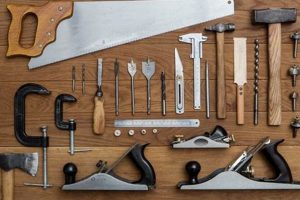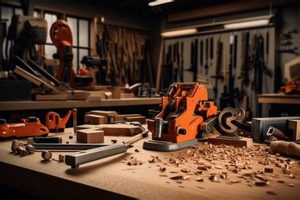The array of implements utilized in shaping and manipulating wood, specifically within the Dallas metropolitan area, encompasses both hand-operated and power-driven instruments. Examples range from traditional chisels and hand planes to modern routers and Computer Numerical Control (CNC) machines, facilitating diverse woodworking projects in the region.
The availability of these instruments is vital for local artisans, construction professionals, and hobbyists. Their accessibility promotes craftsmanship, supports the building trades, and enables the creation of custom furniture, architectural elements, and artistic endeavors. Historically, the acquisition of these specialized items required travel to distant suppliers; however, a robust local market now provides convenient access and support services.
The following sections will delve into specific categories, sources, maintenance, and safety considerations related to procuring and employing implements for transforming raw lumber into finished goods within the aforementioned geographic area.
Essential Guidance on Acquiring and Maintaining Woodworking Instruments in Dallas
This section provides crucial recommendations for those seeking to equip or maintain a woodworking shop in the Dallas area. Attention to these details can enhance efficiency, safety, and the longevity of investments.
Tip 1: Evaluate Project Scope Prior to Purchase: Assess the types of projects anticipated to determine the necessary equipment. A focus on small-scale crafts necessitates a different inventory than large-scale furniture construction.
Tip 2: Prioritize Quality over Initial Cost: While budget constraints are a reality, investing in durable, high-quality tools from reputable brands typically yields long-term savings through reduced replacement and maintenance costs.
Tip 3: Research Local Suppliers and Service Centers: Identifying established Dallas-area vendors and repair facilities ensures access to knowledgeable support and timely maintenance services. Check online reviews and inquire about warranty support.
Tip 4: Emphasize Safety Training and Personal Protective Equipment (PPE): Before operating any power tool, complete appropriate safety training courses. Always utilize recommended PPE, including eye and ear protection, dust masks, and appropriate clothing.
Tip 5: Implement a Regular Maintenance Schedule: Proper maintenance, including cleaning, lubrication, and blade sharpening, is essential for optimal tool performance and lifespan. Adhere to manufacturer-recommended maintenance procedures.
Tip 6: Consider Space Requirements and Storage Solutions: Account for the physical dimensions of equipment and implement efficient storage solutions to maximize workspace and prevent damage to tools.
Tip 7: Leverage Local Woodworking Communities: Engage with Dallas-area woodworking clubs and organizations to share knowledge, receive advice, and potentially source used equipment at favorable prices.
By adhering to these guidelines, woodworking enthusiasts and professionals in the Dallas region can optimize their tool selection, ensure safety, and maximize the return on their investment.
The subsequent sections will delve into advanced techniques and specialized applications relevant to woodworking practices within this geographic context.
1. Local Suppliers
The presence and characteristics of establishments providing implements for shaping wood in the Dallas area exert a significant influence on the accessibility, cost, and overall viability of local woodworking projects. These suppliers form a critical link in the supply chain, connecting manufacturers with end-users.
- Accessibility and Convenience
The geographic distribution of vendors throughout the Dallas metropolitan area directly affects the ease with which individuals and businesses can acquire necessary items. A greater density of suppliers reduces travel time and transportation costs, particularly for smaller operations or hobbyists. For instance, multiple locations across the metroplex facilitate quick procurement of replacement parts or specialized items required for urgent projects.
- Pricing and Competition
The competitive landscape among local distributors influences the pricing structures of woodworking implements. A greater number of vendors often leads to more competitive pricing, benefiting consumers. Conversely, limited competition may result in inflated prices and reduced bargaining power. Monitoring local price trends and comparing offerings from multiple suppliers is crucial for cost-effective procurement.
- Product Variety and Specialization
Different retailers in the Dallas area may specialize in specific types of items. Some may focus on power-driven equipment, while others prioritize hand tools or accessories. This specialization can provide access to a wider range of products and expertise within a particular niche. Identifying vendors that cater to specific project requirements ensures access to the most suitable implements.
- Service and Support
The level of customer service and technical assistance provided by local retailers is a key factor in the overall value proposition. Suppliers offering knowledgeable staff, repair services, and warranty support can provide significant benefits, particularly for complex or high-value equipment. Building relationships with local vendors can facilitate access to expert advice and prompt resolution of technical issues.
Ultimately, the robustness and diversity of the local supplier network significantly contribute to the vitality of woodworking activities in Dallas. The interplay between accessibility, pricing, product variety, and service quality determines the overall efficiency and cost-effectiveness of acquiring and maintaining necessary equipment.
2. Tool Maintenance
The operational effectiveness and longevity of woodworking implements utilized within the Dallas region are directly contingent upon consistent and appropriate maintenance procedures. Neglecting this crucial aspect can result in diminished performance, increased risk of equipment failure, and potential safety hazards, thereby negatively impacting the overall efficiency and quality of woodworking projects in the area.
The connection between tool maintenance and the broader context of Dallas woodworking is exemplified by the challenges posed by the local climate. The seasonal variations, particularly the high humidity levels during the summer months, can accelerate corrosion and degradation of metal components. Consequently, frequent cleaning, lubrication, and rust prevention measures are essential to mitigate these environmental effects. For instance, hand planes and chisels, common in Dallas workshops, require regular honing and sharpening to maintain optimal cutting performance. Similarly, power saws necessitate blade maintenance and alignment to ensure accurate and safe operation. The absence of such practices leads to reduced precision, increased material waste, and potential damage to the implements themselves.
In summary, integrating tool maintenance into the daily workflow of any Dallas-based woodworking operation is paramount. It not only extends the lifespan of valuable equipment but also contributes to improved safety, enhanced project quality, and reduced long-term costs. Addressing this aspect proactively is essential for sustainable and successful woodworking practices within the Dallas metropolitan area.
3. Safety Protocols
The operation of woodworking tools in the Dallas area, as elsewhere, necessitates strict adherence to established safety protocols. Failure to comply with these guidelines can lead to significant injuries, equipment damage, and project setbacks. The relationship between the implements employed and the safety measures implemented is causal; proper protocols mitigate the inherent risks associated with power-driven and hand-operated equipment. For instance, the use of a table saw, a common woodworking tool in Dallas shops, requires adherence to blade guard procedures, push stick utilization, and awareness of kickback hazards. Neglecting these precautions can result in severe lacerations or amputations.
Effective safety protocols encompass a range of practices, including the consistent use of personal protective equipment (PPE), such as eye and ear protection, dust masks, and appropriate gloves. Regular inspection and maintenance of implements are also crucial for identifying and addressing potential hazards before they escalate into accidents. For example, a loose or damaged power cord on a drill press can create an electrocution risk, which can be mitigated by routine inspections and timely repairs. Furthermore, adequate ventilation is essential to minimize exposure to harmful dust and fumes generated during sanding, cutting, and finishing processes. Insufficient ventilation in a closed workshop environment can lead to respiratory problems and long-term health consequences.
In conclusion, the integration of comprehensive safety protocols is an indispensable component of woodworking practices in the Dallas region. Adherence to these guidelines not only minimizes the risk of accidents and injuries but also fosters a culture of safety consciousness, promoting a more productive and sustainable working environment. Addressing safety concerns proactively is essential for safeguarding the well-being of woodworkers and ensuring the successful completion of woodworking projects.
4. Project Specificity
The selection and utilization of implements within the Dallas woodworking sphere is fundamentally dictated by the specific characteristics of each project undertaken. This ‘project specificity’ acts as a primary driver in determining the necessary instruments, techniques, and skill sets required for successful completion. A misalignment between project requirements and available resources, or conversely, an over-investment in tools unsuited to the task, results in diminished efficiency, increased costs, and potentially compromised outcomes. The underlying principle is that each woodworking endeavor presents a unique set of demands, necessitating a tailored approach to tool selection and application.
Illustrative examples highlight this correlation. The construction of intricate, period-style furniture demands precision instruments such as dovetail saws, marking gauges, and specialized chisels, coupled with advanced joinery techniques. Conversely, the creation of rustic, reclaimed wood projects might prioritize rough-sawn lumber, power sanders, and basic fastening methods, foregoing the need for highly refined tools. Similarly, the scale of the project directly influences tool requirements. A small-batch production of wooden toys necessitates different tooling compared to large-scale architectural millwork. Therefore, a comprehensive understanding of project scope, materials, and desired aesthetics forms the foundation for informed tool acquisition and usage decisions within the Dallas woodworking community.
In summation, recognizing the pivotal role of project specificity is paramount for optimizing woodworking practices in Dallas. It enables a strategic approach to tool investment, promotes efficient workflow, minimizes waste, and ultimately contributes to the successful realization of diverse woodworking projects. Overlooking this crucial consideration can lead to inefficiencies, compromised quality, and increased overall costs, underscoring the significance of aligning tool selection with the specific demands of each undertaking.
5. Skill Level
The level of proficiency attained by a woodworker in the Dallas area directly influences the effective selection, application, and maintenance of woodworking implements. This relationship dictates the complexity of projects that can be undertaken, the efficiency of execution, and the overall safety within the workshop environment. Skill level, therefore, becomes a critical factor in the successful integration of available tools into a productive workflow.
- Tool Selection Appropriateness
Beginner woodworkers often benefit from simpler, more forgiving implements. For example, a hand saw with a lower tooth count might be more manageable than a high-precision Japanese pull saw. As proficiency increases, the capacity to utilize more specialized tools expands, allowing for greater precision and efficiency. A seasoned craftsman can effectively wield a complex router setup, while a novice might struggle to control the same tool safely. The appropriateness of tool selection hinges on the ability to understand and execute the necessary techniques.
- Technique Execution
Skill level directly dictates the ability to execute woodworking techniques correctly. An experienced woodworker will be able to create tight-fitting joints with hand tools, while a beginner might rely on power tools for simpler joinery. The execution of techniques such as dovetailing, mortise and tenon joints, or advanced carving requires both knowledge and practice. Skillful execution minimizes errors, reduces material waste, and enhances the structural integrity and aesthetic appeal of finished projects. Lack of skill can lead to flawed results and potentially dangerous situations.
- Safety Awareness and Practice
A higher skill level typically correlates with greater awareness of safety protocols and best practices. Experienced woodworkers are more likely to understand the potential hazards associated with specific tools and to implement appropriate safety measures. For instance, they understand the importance of using push sticks when operating a table saw, wearing appropriate personal protective equipment (PPE), and maintaining a clean and organized workspace. Skill level influences the ability to anticipate potential risks and take preventative measures to avoid accidents and injuries.
- Maintenance Proficiency
An advanced understanding of woodworking often extends to the maintenance and repair of the instruments themselves. A skilled craftsman will be able to sharpen blades, adjust machines, and troubleshoot minor mechanical issues, extending the lifespan of their tools and minimizing downtime. Beginners, on the other hand, might rely solely on professional servicing, incurring additional costs and potentially delaying project completion. The ability to maintain and repair tools demonstrates a deeper understanding of their mechanics and promotes responsible ownership.
The interplay between skill level and the effective utilization of woodworking tools in the Dallas area is undeniable. Proficiency influences tool selection, technique execution, safety practices, and maintenance capabilities, all of which contribute to the overall success and sustainability of woodworking endeavors within the region. Continuous learning, practice, and mentorship are crucial for bridging the gap between novice and expert, enabling woodworkers to maximize the potential of their equipment and achieve their creative goals.
Frequently Asked Questions
This section addresses common inquiries concerning the acquisition, maintenance, and utilization of implements for woodworking in the Dallas metropolitan area. The information provided is intended to offer clarity and guidance for both novice and experienced woodworkers.
Question 1: What constitutes a basic starter set of woodworking instruments for a beginner in the Dallas area?
A fundamental set should include a combination square, hand saw (crosscut and rip), a block plane, a set of chisels, a sharpening stone, a measuring tape, a drill with various bits, and personal safety equipment (eye and ear protection). These tools provide the foundation for introductory projects and allow for the development of basic woodworking skills.
Question 2: Where can individuals source reputable woodworking implements within the Dallas region?
Several options exist, including dedicated woodworking supply stores, large hardware retailers, and online vendors with local distribution centers. Researching customer reviews and comparing product specifications across different suppliers is recommended to ensure quality and value.
Question 3: What are the essential safety precautions to observe when operating power-driven woodworking equipment?
Adherence to manufacturer-recommended safety guidelines is paramount. This includes the consistent use of personal protective equipment (PPE), ensuring proper machine guarding, maintaining a clean and organized workspace, and undergoing appropriate safety training before operating any power tool.
Question 4: How frequently should woodworking implements be sharpened to maintain optimal performance?
The frequency of sharpening depends on the type of tool, the material being worked, and the intensity of use. As a general guideline, chisels and plane irons should be sharpened whenever a noticeable decrease in cutting performance is observed. Power saw blades should be sharpened or replaced when they exhibit dullness or excessive vibration.
Question 5: What are the common environmental factors in Dallas that can affect the lifespan of woodworking instruments?
Humidity fluctuations, particularly during the summer months, can contribute to rust and corrosion of metal components. Proper storage in a dry environment and the application of protective coatings can help mitigate these effects. Temperature extremes can also impact the stability and accuracy of measuring instruments, requiring recalibration.
Question 6: How does one properly dispose of used or broken woodworking blades and other hazardous materials in Dallas?
Metal blades can often be recycled at designated scrap metal facilities. Contacting local waste management services for information on hazardous material disposal is recommended for items such as used solvents, finishes, and treated lumber scraps. Proper disposal prevents environmental contamination and ensures compliance with local regulations.
Understanding these key aspects can significantly improve the woodworking experience in Dallas, promoting both safety and efficiency.
The subsequent section will examine case studies of successful woodworking businesses in the Dallas area, highlighting their strategies and best practices.
Woodworking Tools Dallas
This exploration has examined the crucial role of implements for shaping wood within the Dallas metropolitan area. The availability of local suppliers, diligent tool maintenance, strict adherence to safety protocols, project-specific equipment selection, and the influence of user skill level collectively determine the success and sustainability of woodworking endeavors. Each element presents unique challenges and opportunities for artisans and professionals operating in this region.
The continued evolution of woodworking practices in Dallas necessitates ongoing attention to these factors. Investments in quality equipment, continuous skill development, and a commitment to safety are essential for fostering a thriving woodworking community. Furthermore, awareness of environmental considerations and responsible disposal methods are critical for ensuring long-term sustainability. Future progress relies on the integration of these principles within all woodworking activities.







